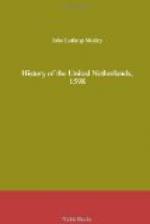Moreover, it should never be forgotten that, although the various kingdoms of Spain were politically conjoined by their personal union under one despot, they were commercially distinct. A line of custom-houses separated each province from the rest, and made the various inhabitants of the peninsula practically strangers to each other. Thus there was less traffic between Castile, Biscay, and Arragon than there was between any one of them and remote foreign nations. The Biscayans, for example, could even import and export commodities to and from remote countries by sea, free of duty, while their merchandize to and from Castile was crushed by imposts. As this ingenious perversity of positive arrangements came to increase the negative inconveniences caused by the almost total absence of tolerable roads, canals, bridges, and other means of intercommunication, it may be imagined that internal traffic—the very life-blood of every prosperous nation—was very nearly stagnant in Spain. As an inevitable result, the most thriving branch of national industry was that of the professional smuggler, who, in the pursuit of his vocation, did his best to aid Government in sapping the wealth of the nation.
The whole accumulated capital of Spain, together with the land—in the general sense which includes not only the soil but the immovable property of a country being thus exclusively owned by the crown, the church, and a very small number of patrician families, while the supply of labour owing to the special causes which had converted the masses of the people into paupers ashamed to work but not unwilling to beg or to rob—was incredibly small, it is obvious that, so long as the same causes continued in operation, the downfall of the country was a logical result from which there was no escape. Nothing but a general revolution of mind and hand against the prevalent system, nothing but some great destructive but regenerating catastrophe, could redeem the people.
And it is the condition of the people which ought always to be the prominent subject of interest to those who study the records of the Past. It is only by such study that we can derive instruction from history, and enable ourselves, however dimly and feebly, to cast the horoscope of younger nations. Human history, so far as it has been written, is at best a mere fragment; for the few centuries or year-thousands of which there is definite record are as nothing compared to the millions of unnumbered years during which man has perhaps walked the earth. It may be as practicable therefore to derive instruction from a minute examination in detail of a very limited period of time and space, and thus to deduce general rules for the infinite future, during which our species may be destined to inhabit this planet, as by a more extensive survey, which must however be at best a limited one. Men die, but Man is immortal, and it would be a sufficiently forlorn prospect for humanity if we were not able




